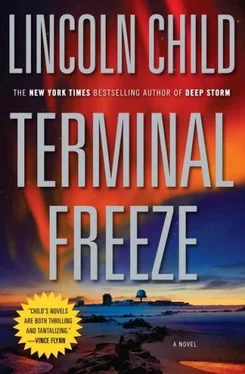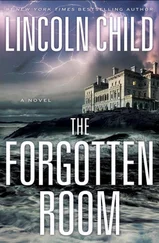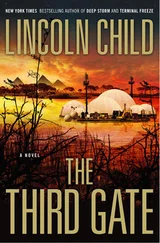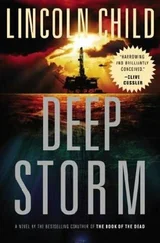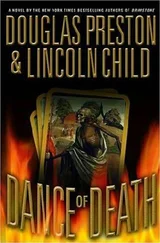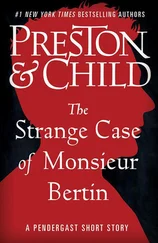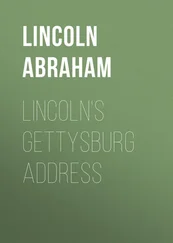The gargle in Creel’s throat changed to a low keening, then rose abruptly to a ragged scream.
And then the thing leapt toward them.
Everything happened at once. Creel yelled incoherently, falling backward instinctively while simultaneously raising his weapon. Phillips and Marcelin opened fire from the far corner, their bullets ripping along the wall and ricocheting over Gonzalez’s head with sharp whines. Gonzalez felt himself brutally knocked to one side as the thing fell upon Creel: there was a low crunching, like the sound of a chicken joint giving way, and the foreman gave another terrible scream-this time of pain. Gonzalez leapt to his feet, room spinning, grabbed his gun, and whirled around, taking aim. He saw right away it was too late for Creel. The creature was taking him apart like a rag doll, coronas of blood and gore rising in a red mist. The others had stopped firing. As Gonzalez stared, the thing looked up at him, its face a mask of red. In the faint light, Gonzalez thought he saw the edges of its mouth raise in what could only have been a smile. And then he was running, running, past the storage racks and out the door in the wake of Phillips and Marcelin, through the first room and into the corridor and on, running, running…
The air in the life-sciences lab seemed to freeze. For a long moment, everybody in the room simply stared at Usuguk. For his part, the Tunit stood close to the doorway, motionless, his sealskin boots and his parka of caribou skin and blanket cloth in stark contrast to the drab metal walls and prosaic instruments.
“You,” said Marshall, surprise thickening his voice. “You’re the eighth scientist.”
“That is what they called me,” replied Usuguk.
Across the room, Logan frowned. “What do you mean?”
For a long time, Usuguk said nothing. His dark eyes looked at each of them in turn. Then they focused on a spot beyond all of them, a spot that to Marshall seemed far, far away. “I am an old man,” he said. “May I sit?”
“Of course.” Marshall hurried to get him a chair. The shaman lowered himself onto it, placed his medicine bundle on his knees.
“I was a specialist,” he said in his uninflected accent. “Army specialist. I grew up a hundred miles from here. In the old days, my people lived in a settlement near Kaktovik. I lived with my cousin’s family. My mother died giving birth to me, and my father starved to death when I was six, out on the ice, looking for caribou. I grew up foolish, full of quiniq. Back then, sitting for hours at a breathing hole, waiting to spear a seal-it was not enough for me. I did not respect the old ways. I did not understand the circle of beauty, the glamour of the snow. An army recruiter came through Kaktovik once a year, full of talk of far places. I had learned your language; my arm was strong. So I enlisted.” He shook his head slowly. “But I spoke Inuit; I spoke Tunit. So after six months at Fort Bliss they sent me back here, to this base.”
“Was the base operational?” Marshall asked.
“Ahylah.” The Tunit nodded. “All except the north wing. That was still being completed. It had to be built below the level of the snow.”
“Why?” Logan asked.
“I do not know. It was a secret. For tests. Some experiments with sonar.” Usuguk paused. “The army put several of us Tunits to work, digging out the ice for the north wing and placing supports. All Tunits knew the mountain to be a bad place where the evil gods dwell. But we were few, and poor, and the money of the kidlatet-white man-was hard to resist. My uncle was one of the workers. It was he who found it.”
“Found what?” asked Marshall.
“Kurrshuq,” Usuguk said. “Fang of the Gods. The Devourer of Souls.”
The others exchanged glances.
“What exactly is kurrshuq?” Logan asked.
“It is that which you have awakened.”
“What?” Sully spoke up. “The same creature? That can’t be.”
The Tunit shook his head. “Not the same. Another.”
Marshall felt surprise burn its way through him. Was this possible?
Silence settled briefly over the group. “Go on,” Sully said at last.
“It was encased in ice in a small crevasse at the base of the wing,” Usuguk continued.
“Probably frozen by the same phenomenon,” Faraday murmured.
“My uncle was very agitated. He came to me. And I went to Colonel Rose.”
“The base commander,” said Logan.
Usuguk nodded. “No one else was to know. My uncle had me tell the colonel that the army must leave the spot at once. It was forbidden ground. And the kurrshuq was its guardian.” He paused. “But they did not leave. Instead the colonel sealed off the crevasse and summoned them.”
“Them?” Marshall repeated.
“The special scientists. The secret scientists. They arrived before the new moon. Two cargo planes, their bellies full of strange instruments. These were all placed in the north wing, under darkness.”
“So the north wing was re-tasked,” Logan said. “Its original purpose set aside while the new discovery was examined.”
“Yes.”
“What of your uncle?” Logan continued. “The other Tunits?”
“They left immediately.”
“But you stayed.”
Usuguk bowed his head. “Yes. To my everlasting shame. I told you I had little use for the ways of my tribe. And the scientists needed a helper, someone who understood the operations of the base. Someone who could also act as-as protection. Since I already knew of the kurrshuq, I was selected. They were kind to me, included me in their work. They called me ‘the little scientist.’ One of them, the kidlatet called Williamson, was interested in…” He paused, apparently hunting for the word. “In sociology. I shared with him some of the legends of my people, our history and beliefs.”
“And what of the…the creature?” Marshall asked.
“It was cut very carefully from the ice, taken from the crevasse, put in a freezer in the north wing. The scientists were to study it, measure it, then thaw it. But it soon thawed itself.”
“Thawed itself?” Sully repeated.
“Of course.” Usuguk shrugged as if perplexed by Sully’s incredulous tone.
Marshall and Faraday exchanged glances. “It was alive?” Marshall asked.
“Yes.”
“And it was hostile?”
“Not-not at first. Kurrshuq is a crafty demon. It plays with you, like the fox cub plays with a vole. The scientists were intrigued. Once they had recovered from their fear, they were intrigued.”
“Their fear?” Marshall asked.
“The kurrshuq is terrifying to behold.”
Logan pulled out a leather notebook. “Will you describe it?”
“No.”
Another brief silence.
“Tell us what happened,” Marshall said. “To the scientists.”
“As I told you, it pretended to humor us. Pretended to be friendly. The scientists continued their observations and tests. They tested its strength and speed. They grew more and more excited-especially by its ability to defend itself. They talked of testing its intelligence, of finding ways to-what was the word they used?-of weaponizing it. But on the third day it chose to do the will of the evil gods. It wearied of toying with us. One of the scientists, the kidlatet named Blayne, was testing its…its instinct for the hunt. What they wanted it to hunt they would not tell me. He had a tape recorder, with the sounds of animals in distress-marmots, snowshoe rabbits. When he played the tape, it grew angry. It tore him to pieces. We heard his screams and came running. When we arrived his body was all over the audio lab. And the kurrshuq was asleep on the floor, Blayne’s head between his forepaws. It had eaten his soul.”
Marshall glanced at Logan. The historian had a small leather notebook open and was writing furiously.
Читать дальше
